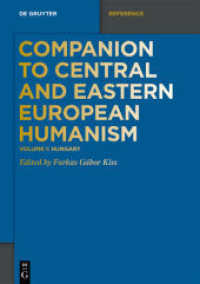- ホーム
- > 洋書
- > 英文書
- > Politics / International Relations
基本説明
Arguing that the dissemination of competence in a common lingua franca is a process to be welcomed, and that linguistic diversity is not valuable in itself but it will nonetheless need to be protected as parity of esteem.
Full Description
In Europe and throughout the world, competence in English is spreading at a speed never achieved by any language in human history. This apparently irresistible growing dominance of English is frequently perceived and sometimes indignantly denounced as being grossly unjust. Linguistic Justice for Europe and for the World starts off arguing that the dissemination of competence in a common lingua franca is a process to be welcomed and accelerated, most fundamentally because it provides the struggle for greater justice in Europe and in the world with an essential weapon: a cheap medium of communication and of mobilization.
However, the resulting linguistic situation can plausibly be regarded as unjust in three distinct senses. Firstly, the adoption of one natural language as the lingua franca implies that its native speakers are getting a free ride by benefiting costlessly from the learning effort of others. Secondly, they gain greater opportunities as a result of competence in their native language becoming a more valuable asset. And thirdly the privilege systematically given to one language fails to show equal respect for the various languages with which different portions of the population concerned identify. The book spells out the corresponding interpretations of linguistic justice as cooperative justice, distributive justice and parity of esteem, respectively. And it discusses systematically a wide range of policies that might help achieve linguistic justice in these three senses, from a linguistic tax on Anglophone countries to the banning of dubbing or the linguistic territoriality principle.
Against this background, the book argues that linguistic diversity is not valuable in itself but it will nonetheless need to be protected as a by-product of the pursuit of linguistic justice as parity of esteem.
Contents
Introduction ; 1. Lingua Franca ; Appendix: Three Alternatives to Lingua Franca Convergence ; 2. Linguistic Justice as Fair Cooperation ; Appendices ; 3. Linguistic Justice as Equal Opportunity ; 4. Linguistic Justice as Parity Of Esteem ; 5. Linguistic Territoriality ; 6. Linguistic Diversity ; Conclusion ; Bibliography








